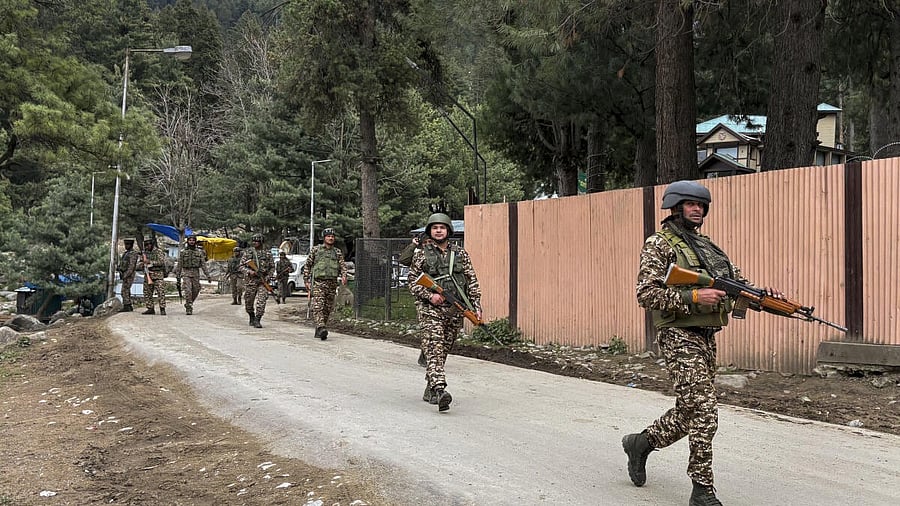
Security personnel during a search operation following a terror attack at Pahalgam, in Anantnag district, Jammu and Kashmir, Thursday, April 24, 2025.
Credit: PTI Photo
Srinaga: Five days after terrorists massacred 26 civilians, mostly tourists, at the scenic Baisaran meadow in Pahalgam, security forces are yet to track down the perpetrators as Jammu and Kashmir stands on the brink of renewed conflict, with both internal tensions and border hostilities escalating sharply.
Despite an aggressive crackdown across the Valley — involving raids, arrests, and widescale search operations — the terrorists responsible for the bloodshed remain elusive. Officials admit the search has been complicated by the rugged terrain and possible local support networks aiding the attackers.
On Sunday, the Ministry of Home Affairs formally handed over the Pahalgam terror attack probe to the National Investigation Agency (NIA). The Jammu and Kashmir Police, meanwhile, had on Thursday released sketches and identities of three terrorists believed to be behind the April 22 massacre — Adil Hussain Thoker, a local militant, and two suspected Pakistani nationals, Ali Bhai alias Talha Bhai, and Hashim Musa alias Suleiman.
In a bid to break the alleged terror networks, security forces have in recent days razed the properties of active terrorists, including Adil Thoker, and raided dozens of suspected safehouses. Hundreds of suspected OGWs have been detained for questioning. Similar action is being prepared against 14 other listed local terrorists affiliated with Lashkar-e-Taiba (LeT), Jaish-e-Mohammad (JeM), and Hizbul Mujahideen (HM), along with a dozen others operating from across the border.
Amid these developments, the situation along the Line of Control (LoC) has also sharply deteriorated, with the Pakistan Army violating the 2021 ceasefire agreement across multiple sectors for the last five days. The continuous firing has stoked fears of a broader military confrontation.
Security agencies have instructed border residents to clear and prepare underground bunkers, while asking farmers to expedite harvesting of their crops along vulnerable stretches near the LoC and the International Border.
“Nobody knows what will happen next. We are cleaning and preparing our bunkers to save ourselves if shelling starts,” said Ramzan Chechi, a resident of the Uri sector in Baramulla district.
The ceasefire violations come amid a string of retaliatory measures taken by New Delhi against Islamabad following the Pahalgam attack. The Centre has suspended key provisions of the 1960 Indus Water Treaty, downgraded bilateral ties, and ordered the closure of the Attari border checkpost to trade — signaling a hardening stance.
The gravity of the situation prompted Army Chief General Upendra Dwivedi’s visit to Srinagar on Friday. He reviewed the overall security situation, particularly along the LoC and infiltration routes, and emphasized maintaining a high state of operational readiness. India shares a total 3,323-km border with Pakistan, of which 221 km International Border and 744 km of LoC falls in Jammu and Kashmir, a region now facing fresh threats of escalation.
While security forces intensify their operations, anxiety hangs heavy across the Valley. Tourist numbers — which had reached record highs this spring — have sharply dropped, delivering another blow to the local economy.
Vowing to punish every terrorist, Prime Minister Narendra Modi has said that Indian troops will pursue them to the ends of the earth. The fear of war has engulfed Kashmir with people praying for peace and an end to violence.
The fear of war, once a distant memory, has returned to Kashmir. Prayers for peace now echo across Kashmir. But under the shadow of guns, a battered Valley waits — mourning its dead and bracing for what lies ahead.